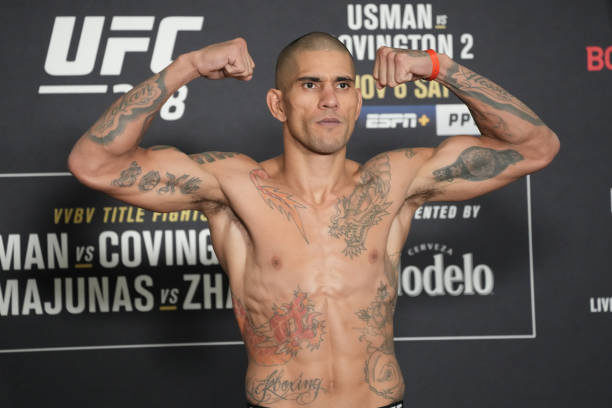Alex Pereira has become a household name in the UFC world, captivating fans with his incredible knockout power and rapid ascent to championship status. Since stepping into the Octagon in 2021, “Poatan” has achieved what many fighters dream of, securing titles in two different weight classes. As he prepares to defend his light heavyweight belt for the third time at UFC 307 against Khalil Rountree Jr., public interest extends beyond his fighting prowess to his personal background. A frequent question among fans is about his roots and where he comes from. Let’s delve into Alex Pereira’s ethnicity and explore his fascinating heritage.
For those curious about Alex Pereira’s background, the answer lies in his connection to a vibrant indigenous community in Brazil. Alex Pereira is of Pataxó ethnicity. This rich heritage is a significant part of his identity and story, influencing not just his personal journey but also aspects of his public persona as a fighter.
Alex Pereira’s Pataxó Ethnicity: Unveiling His Roots
The Pataxó people are an indigenous tribe native to Brazil, adding a unique layer to Alex Pereira’s identity as a global sports icon. Understanding his ethnicity means exploring the history and culture of this community.
Early Life and Pataxó Heritage
Growing up, Alex Pereira’s life was far from the glitz and glamour of UFC championships. His early experiences were grounded in the realities faced by many within the Pataxó community. Financial constraints led him to leave school and take on physically demanding jobs, first as a bricklayer’s assistant and later at a tire shop. During these formative years, Pereira faced challenges, including struggles with alcohol, a candidly discussed part of his past.
 Alex Pereira early career image
Alex Pereira early career image
Image depicting Alex Pereira during his early career, highlighting his dedication and focus even before UFC fame, showcasing his journey from humble beginnings to becoming a champion.
It was at the age of 21 that Pereira’s life took a transformative turn when he discovered martial arts and kickboxing. From that point forward, he not only honed his physical skills but also began to proudly represent his Pataxó roots on a global stage. His journey from a challenging youth to UFC stardom is intertwined with his ethnic identity, making his achievements even more inspiring.
The Pataxó Tribe: Culture and History
The Pataxó tribe, to which Alex Pereira belongs, is an indigenous group with a population of just over 12,000 people, primarily located in the Bahia region of Brazil. Historically, they spoke the Pataxó language, which is now considered extinct. However, efforts to revitalize their linguistic heritage have led to the emergence of Patxohã, a revitalized language, alongside the use of Portuguese. This blend of linguistic influences reflects the Pataxó people’s resilience and adaptation over time.
The 20th century brought significant hardship to the Pataxó community. Their ancestral lands were largely converted into private farms, leading to displacement and integration into broader society, often at the cost of their indigenous identity. Despite these challenges, the Pataxó have maintained a strong sense of cultural heritage, which Alex Pereira actively embodies and promotes.
‘Poatan’: A Nickname Rooted in Indigenous Identity
Alex Pereira’s fighting nickname, “Poatan,” is not just a catchy moniker; it’s deeply connected to his Pataxó ethnicity and language. In the Pataxó language, “Po” translates to “hand,” and “Atan” means “stone.” Thus, “Poatan” literally means “stone hands,” a fitting description for a fighter known for his devastating knockout power.
This nickname serves as a constant reminder of Pereira’s heritage and a way for him to honor his roots with every fight. He further solidified this connection by getting a tattoo of pebbles and rocks on his left hand, a visual representation of his “stone hands” nickname and his Pataxó identity.
Honoring Heritage in the Octagon and Beyond
Pereira’s commitment to his Pataxó heritage extends beyond his nickname and symbolism. His signature bow and arrow walkout ritual, a visually striking part of his entrance, is also a direct homage to his indigenous culture. As Pereira explained in an interview with ESPN, this ritual, combined with indigenous music, was intentionally created to represent and celebrate his background.
View this post on Instagram
Embedded Instagram post from ESPN MMA showcasing Alex Pereira’s iconic bow and arrow walkout, emphasizing the visual representation of his Pataxó heritage and cultural pride within his UFC persona.
Moreover, Pereira has expressed a strong desire to use his platform to support the Pataxó community. Recognizing the struggles faced by his people, he aims to raise awareness and provide assistance. During the pandemic, he traveled to Porto Seguro to donate food to the native population, demonstrating his ongoing commitment to giving back and supporting his community in practical ways. This dedication reflects a deep-seated sense of responsibility and pride in his Pataxó ethnicity.
In conclusion, Alex Pereira’s ethnicity is Pataxó, an indigenous Brazilian tribe with a rich history and culture. This heritage is not just a detail in his biography but a core aspect of his identity, influencing his nickname, walkout ritual, and his broader aspirations to support his community. As he continues to compete at the highest levels of UFC, Alex Pereira carries the spirit and legacy of the Pataxó people with him, making his journey in combat sports all the more meaningful.